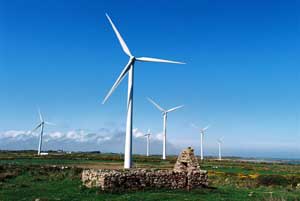21 July 2005 Edition
No excuse for ESB price rises

Ireland has massive potential for wind energy
Ireland could be world leader in renewable energyUnderused natural resources, unjustified price increases and a massive €1 billion levy on households in the Six Counties because of privatisation. Welcome to the Irish electricity market where this week 26-County customers face their fourth winter of higher energy prices.
Last week the ESB announced €302 million in profits for 2004, but are seeking a 10% price rise from the energy regulator. Such a rise, if granted would mean that energy prices have risen by 46% since early 2002, over five times the rate of inflation during the same time period.
The proposed price increases were criticised by Sinn Féin's Seán Crowe. The Dublin Southwest TD said: "There is no excuse whatsoever for these proposed increases — not even the rise in the price of oil — considering the massive profits that are being made by the ESB.
Crowe also said that while it is good to see a semi-state company perform so well it should be remembered that, "this is a public utility and not a private profit-making enterprise. Its purpose is to provide a service to the public not to screw them for every last cent they have. I am very concerned that the recent massive price hikes are part of the government's plan to fatten up the company in advance of selling it off. I would urge the energy regulator to reject the ESB's request for the increase".
The views of energy regulators were also on the mind of Mitchel McLaughlin, Sinn Féin General Secretary, Economy Spokesperson and Foyle MLA.
McLaughlin met last week with Douglas McIldoon, the Six-County Energy Regulator who revealed that the flawed electricity privatisation brokered by previous Direct Rule Ministers will result in an additional cost of £1 billion on northern households and businesses.
McLaughlin said: "It has been well established that the privatisation deal, and particularly the fixed long-term generation contracts, brokered by British Direct Rule Ministers in the 1990s has been a disaster. It has been bad for the individual domestic customer and bad for the economy. It has also contributed to the unacceptable levels of fuel poverty that mean that over 2,000 people die every year from cold-related illness".
McLaughlin believes that McIldoon's revelation that by the end of the decade electricity privatisation will have taken an additional £1 billion out of the local economy must be addressed.
However this is only one element of the mismanagement of energy resources in Ireland. Part of the ESB of price rises are driven by higher oil prices, yet in both parts of Ireland there has been systematic under investment in the alternatives such as renewable energy resources.
A report by the Marine Institute this week has found that Ireland could become a "world leader" in marine renewable energy. The report recommends that "high visibility, long term government support" is needed.
This sector could grow to be worth €6 billion by 2009. It is clear that there is a way out of this endless cycle of energy price rises and private sector profiteering. The only gap is a government with the vision to make Ireland the centre of global renewable energy that it could be.
